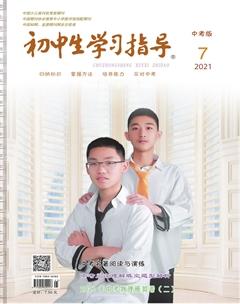宾语从句考点梳理(一)
曲永华
宾语从句是中考必考考点之一,主要考查宾语从句的时态、语序、引导词。考查的主要形式是单项填空、完形填空、短文填空和完成句子等。
考点一: 宾语从句的引导词
1. 由that引导的宾语从句。that没有实在意义,可以省略。如:I am sure (that) he will succeed.
2. 由连接代词who, whom, whose, what, which和连接副词when, where, why, how引导的宾语从句。这些连接代词和连接副词在宾语从句中充当某个成分。如:Do you know who (whom) they are waiting for?
3. 由if或whether引导的宾语从句。if和whether在句中的意思是“是否”。
典例:(2020·贵州·黔西南州)Jeff asked his students, “Do you know it is important to protect the earth?”(改为间接引语)
Jeff asked his students they it is important to protect the earth.
【解析】一般疑问句改为宾语从句时要用连词if/whether; 当主句的时态是一般过去时,从句也要用相应的过去时态,可知后面用knew。
典例:(2019 · 江苏·淮安)Excuse me, could you tell me ?
A. when he was born B. how far is it from here
C. what does he look like D. where he leaves for yesterday
【解析】根据题意既要考虑引导词的选择,还要考虑语序,排除BC;选项D用一般现在时态,排除D。故A符合语境。
考点二: 宾语从句的语序
1. 陈述句变为宾语从句,由连词that引导,语序不变,即仍用陈述语序。如:
He is an honest boy. The teacher said. → The teacher said(that) he was an honest boy.
易错提示:that引导的宾语从句变成被动语态时,只变主句,不变从句。如:It is said that ...(据说……);It is known that ...(众所周知……);It is reported that ...(据报告……)等,也可把它们当作固定句式来运用。如:It is said that he is from Canada.
2. 一般疑问句变为宾语从句时,连词用if和whether引导;特殊疑问句变为宾语从句时,连词用特殊疑问词引导,语序都要变为陈述语序。
易错提示(1):一般情况下,if和whether可互换,在口语中多用if,而在以下几种情况下,只能用whether。
①与 or 连用分别引导两个从句时,或强调两方面的选择, 特别是句中有or not时用whether,不用if。如:I don’ t know whether you will come to my party or not tomorrow.
②在动词不定式之前只能用whether,不用if。如:I can’ t make up my mind whether to go or not.
③在介词之后只能用whether引导宾语从句,不用if。如:It depends on whether I have enough time.
④宾语从句置于句首表示强调时,用whether,不用if。如:Whether this is true, I can’ t say.
易错提示(2):当疑问代词what、who在特殊疑问句中作主语时,该特殊疑问句本身就是陈述句语序,所以当该句用来作宾语时,语序不需要调整。
What’s wrong with her? → He asked the girl what was wrong with her.
What’s the matter? → He asked the girl what was the matter.
What has happened to him? → We want to know what has happened to him.
典例:(2020 ·貴州·安顺)The BBC’s documentary Du Fu:China’s Greatest Poet explains
Du’s works have been popular for centuries.
A. when B. whether C. why
【解析】句意:“英国广播公司的纪录片《杜甫:中国最伟大的诗人》解释了为什么杜甫的作品在几个世纪以来广受欢迎。”根据句意可知,要用引导词why,故选C。
典例:(2020 ·北京)— Do you know ?
—At 9:00 tomorrow morning.
A. when the video meeting began
B. when did the video meeting begin
C. when the video meeting will begin
D. when will the video meeting begin
【解析】句意:“——你知道视频会议什么时候开始吗?——明天上午9点。”宾语从句中从句语序应该为陈述句语序,因此排除B和D;根据答语“At 9 o’clock tomorrow morning”可知,询问的应该是将来的事,用一般将来时,选项A是一般过去时,故选C。
(未完,待续)

